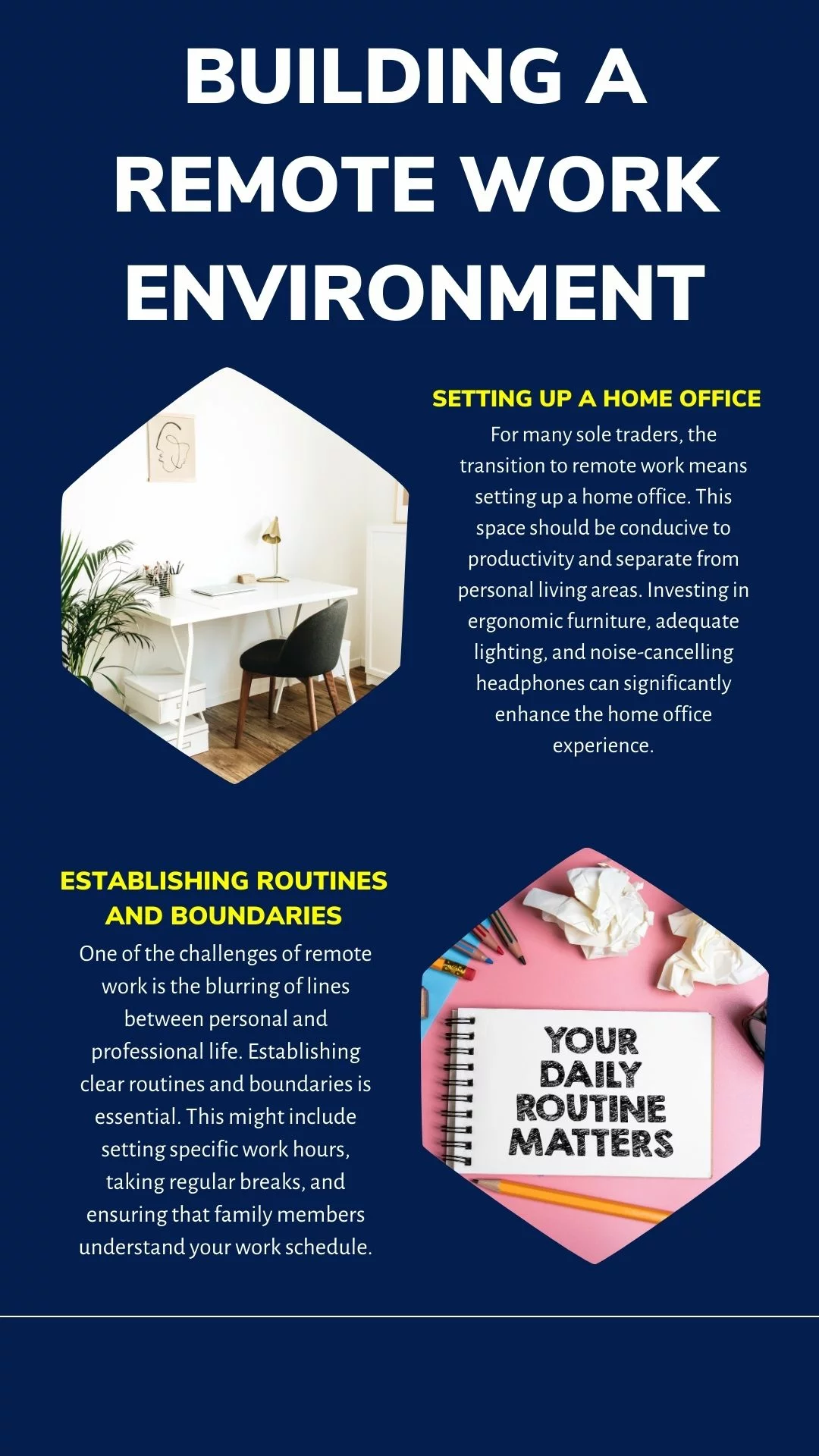The world of work is transforming at an unprecedented pace, largely driven by advancements in technology and the widespread adoption of remote working practices. For sole traders, the shift towards remote work presents both unique opportunities and challenges. Embracing these changes requires strategic planning, adaptability, and the effective use of technology. In this context, understanding the future of remote work and how to navigate it becomes crucial for sole traders aiming to thrive in this evolving landscape.
The Remote Work Revolution
The concept of remote work has been gaining traction for several years, but recent global events have accelerated its adoption across industries. This shift is not just a temporary response to extraordinary circumstances but a fundamental change in how we perceive and approach work. Remote work offers flexibility, reduces commute times, and allows for a better work-life balance. However, it also brings challenges, such as the need for self-discipline, effective communication, and the ability to separate work from personal life.
For sole traders, remote work opens up a world of possibilities. It allows for greater flexibility in terms of working hours and location, offering the opportunity to tap into a global market. However, it also requires them to be more proactive in seeking opportunities, networking, and maintaining client relationships.
Also Read: How To Pay Tax As A Sole Trader?
Harnessing Technology For Efficiency
In the realm of remote work, technology is a double-edged sword. On the one hand, it provides the tools necessary to work efficiently from anywhere. On the other hand, it requires sole traders to stay updated with the latest advancements to remain competitive.

Digital Collaboration And Communication Tools
The use of digital collaboration tools is essential for remote working. These tools allow for seamless communication with clients and collaborators, irrespective of their physical location. Video conferencing, cloud-based project management software, and instant messaging apps are just a few examples of how technology is making remote work more feasible and efficient.
Accounting And Financial Management
Financial management is a critical aspect of running a successful sole trader business. This is where specialised tools like the Sole app come into play. Designed specifically for Australian sole traders and small businesses, Sole provides an intuitive platform for managing finances, from invoicing to expense tracking. Its features are tailored to the unique needs of sole traders, making tax time less daunting and financial management more streamlined. By automating and simplifying these tasks, Sole helps sole traders focus on what they do best: growing their business.
Building A Remote Work Environment
Creating an effective remote work environment is more than just having the right technology. It involves setting up a dedicated workspace, establishing routines, and developing self-discipline.

Setting Up A Home Office
For many sole traders, the transition to remote work means setting up a home office. This space should be conducive to productivity and separate from personal living areas. Investing in ergonomic furniture, adequate lighting, and noise-cancelling headphones can significantly enhance the home office experience.
Also Read: GST For Sole Traders: Navigate Compliance & Benefits
Establishing Routines And Boundaries
One of the challenges of remote work is the blurring of lines between personal and professional life. Establishing clear routines and boundaries is essential. This might include setting specific work hours, taking regular breaks, and ensuring that family members understand your work schedule.
Networking And Building Relationships Remotely
Networking and client relationship management are crucial for sole traders. In a remote work setting, these activities require a different approach.
Leveraging Online Platforms
Online platforms offer numerous opportunities for networking and marketing. Social media, professional networking sites, and online forums are valuable tools for building and maintaining connections. Participating in webinars, virtual conferences, and online workshops can also help in expanding your network.

Maintaining Client Relationships
Building and maintaining client relationships remotely requires consistent communication and reliability. Regular updates, prompt responses to inquiries, and delivering quality work are key to sustaining long-term relationships with clients.
Adapting To Changing Market Demands
The market is constantly evolving, and so are the needs and expectations of clients. Sole traders must be adaptable and ready to learn new skills or pivot their business strategies to meet these changing demands.
Continuous Learning And Skill Development
Investing in continuous learning and skill development is vital. This could involve taking online courses, attending workshops, or simply staying abreast of industry trends and best practices.
Diversifying Services And Products
Diversifying your offerings can help mitigate risks and tap into new market opportunities. This might mean expanding your services, exploring new niches, or adapting your products to suit the remote work environment.
Embracing Digital Marketing In A Remote World
In a remote work environment, digital marketing becomes a linchpin for sole traders. The ability to effectively market your services or products online directly correlates with your visibility and, ultimately, your success.

Developing A Strong Online Presence
A robust online presence is more than just a website; it involves an integrated approach encompassing social media, content marketing, and search engine optimisation (SEO). As a sole trader, creating content that resonates with your target audience can significantly increase your reach. This might include blog posts, videos, podcasts, or infographics that provide value and showcase your expertise.
Also Read: Can Sole Traders Have Employees?
Utilising SEO And Analytics
Understanding and implementing SEO strategies can dramatically improve your visibility online. By optimising your website and content for search engines, you increase the likelihood of appearing in top search results, thus attracting more potential clients. Additionally, using analytics tools helps you understand your audience better, allowing you to tailor your marketing strategies effectively.
Balancing Work And Personal Life
The intersection of work and personal life is a critical area for sole traders working remotely. Achieving a balance is vital for maintaining both productivity and well-being.
Time Management Strategies
Effective time management is key to balancing work and personal life. This includes prioritising tasks, setting realistic goals, and using time management tools and techniques. Techniques like the Pomodoro Technique or time blocking can help in maximizing productivity while ensuring you have time for personal activities and rest.
The Importance Of Self-Care
Self-care should not be overlooked in the hustle of remote work. Regular exercise, adequate sleep, and hobbies can significantly improve mental health and overall productivity. Remember, taking care of yourself is not a luxury but a necessity for long-term success and health.
Conclusion
The future of remote work for sole traders is both exciting and challenging. It requires a strategic approach, embracing technology, and an adaptable mindset. By leveraging tools like the Sole app for efficient financial management, creating an effective remote work environment, building strong online networks, and continuously adapting to market changes, sole traders can not only survive but thrive in this new era of work.


